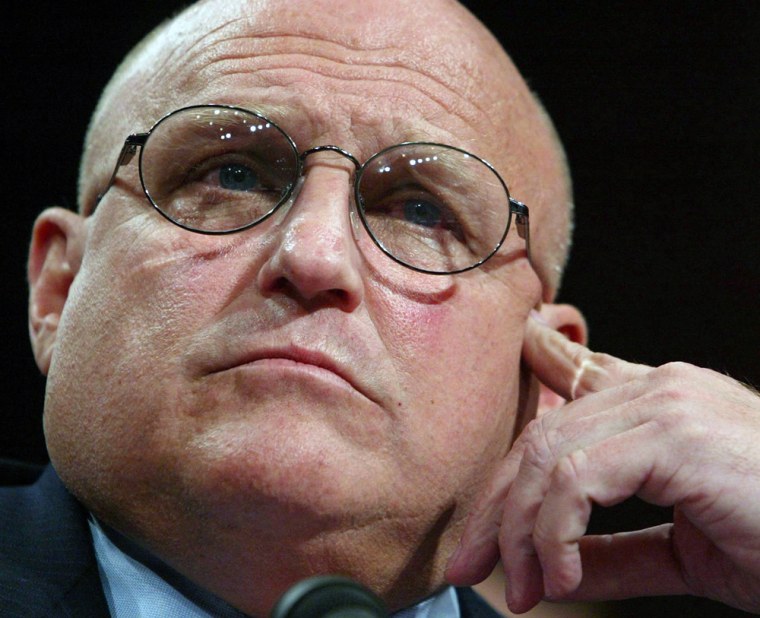For three years, Special Prosecutor Patrick Fitzgerald knew the answer to one of the biggest questions in Washington: Who leaked the identity of CIA operative Valerie Plame?
Now that former Deputy Secretary of State Richard Armitage acknowledged this week that he was the leaker, the new question is what Fitzgerald has been looking for during a quest that rattled the White House and sent a reporter to jail.
“What was the rationale for seeking an answer to a question he already knew the answer to?” asked Wayne Berman, a former assistant secretary of commerce and a supporter of the only person indicted in the leak case, former White House aide I. Lewis “Scooter” Libby.
Fitzgerald’s office had no response to that question Friday.
Armitage said he inadvertently revealed Plame’s job to syndicated columnist Robert Novak in July 2003. That revelation came as Plame’s husband, Joseph Wilson, criticized the Bush administration’s prewar intelligence on Iraq.
Novak’s column touched off claims that the White House was behind a smear campaign, which led to a federal investigation into the leak and whether it was part of a partisan effort to undermine Wilson’s credibility.
Probe went on despite admission
Early in the inquiry, Armitage told authorities he was Novak’s source. Armitage said Fitzgerald asked him to not to say that publicly. Fitzgerald then pressed on with the investigation, questioning White House aides. Among them was top Bush adviser Karl Rove, who appeared five times before a grand jury before being cleared of wrongdoing this summer.
When Libby was indicted in October 2005 on charges of obstruction of justice, perjury and lying to investigators, Fitzgerald said Libby was the first official to discuss Plame in a conversation with New York Times reporter Judith Miller.
That’s where this week’s admission by Armitage muddles the case.
After Fitzgerald’s comment about Libby at a news conference, Washington Post reporter Bob Woodward reminded Armitage that he had made a passing comment to him days before Libby’s conversation with Miller. That meant that Armitage, not Libby, had been the first to mention it to a reporter, and he quickly informed the prosecutor of that recollection.
‘The whole world was watching’
Former Republican Sen. Fred Thompson, who has criticized Libby’s prosecution, said Fitzgerald had a duty to set the record straight yet continued to urge Armitage’s silence. Thompson said the case shows the worst side effects of appointing a special prosecutor.
“The whole world was watching Mr. Fitzgerald,” Thompson said. “He had an extremely narrow focus and a lot of pressure to come up with something or somebody. He came up with a pea and tried to hold a press conference and hold it up as an elephant.”
Armitage wasn’t the only one asserting that his memory had failed. Both Libby and Rove have said they forgot details about their conversations with reporters. At least one of Rove’s trips to the grand jury was so he could freshen his testimony with something he said he had forgotten in an earlier appearance.
Although Libby was the only one indicted, two reporters were threatened with jail for not disclosing sources. One of them — Miller — served 85 days.
Two views of the investigation
Lucy Dalglish, executive director of the Reporters Committee for Freedom of the Press, said Friday she believes Fitzgerald knew that no crime had been committed with the leak of Plame’s identity, yet he forced reporters to disclose their confidential sources and even sent Miller to jail.
“After a while, he didn’t care who the source was,” Dalglish said. “They just wanted to get somebody on obstruction.”
Attorney Melanie Sloan, who represents the Wilsons in a civil lawsuit claiming Libby, Vice President Dick Cheney and others conspired to leak Plame’s identity, said the investigation was necessary.
Fitzgerald knew Armitage’s leak started the scandal, Sloan said, but he didn’t know who else leaked information to the media. That’s what the three-year investigation has been about, she said.
Berman, the Libby supporter, sees things differently. He said Armitage’s admission contradicts the conspiracy theory and raises questions about why Libby was ever charged.
“Scooter was singled out, for whatever reason, by a prosecutor who appears to have made different decisions about people who had similar circumstances,” Berman said.
